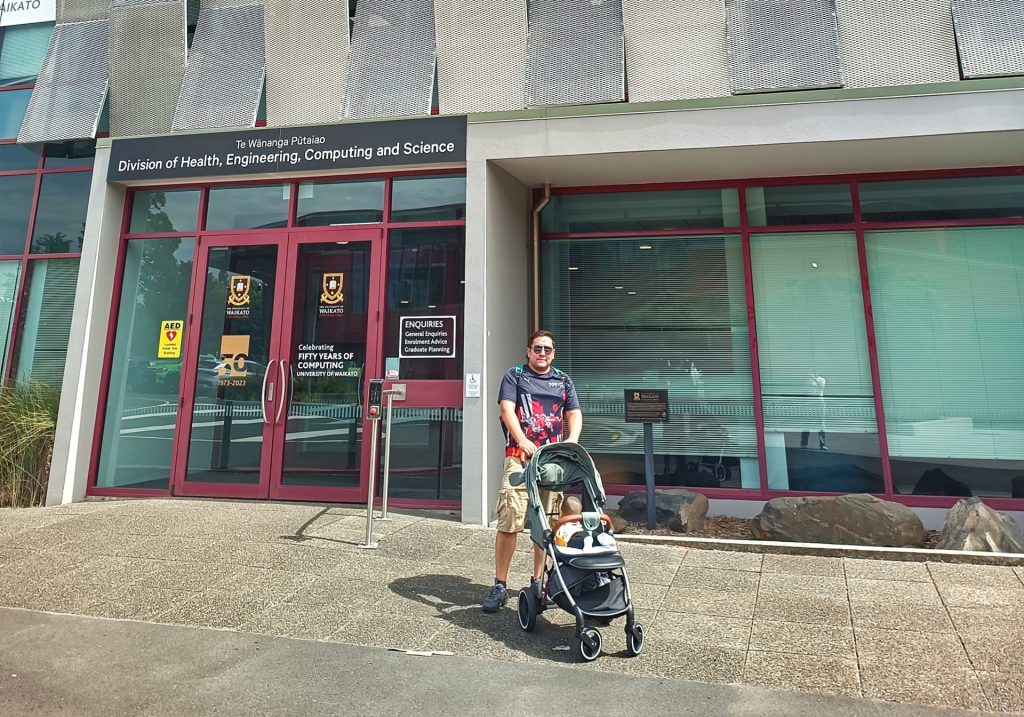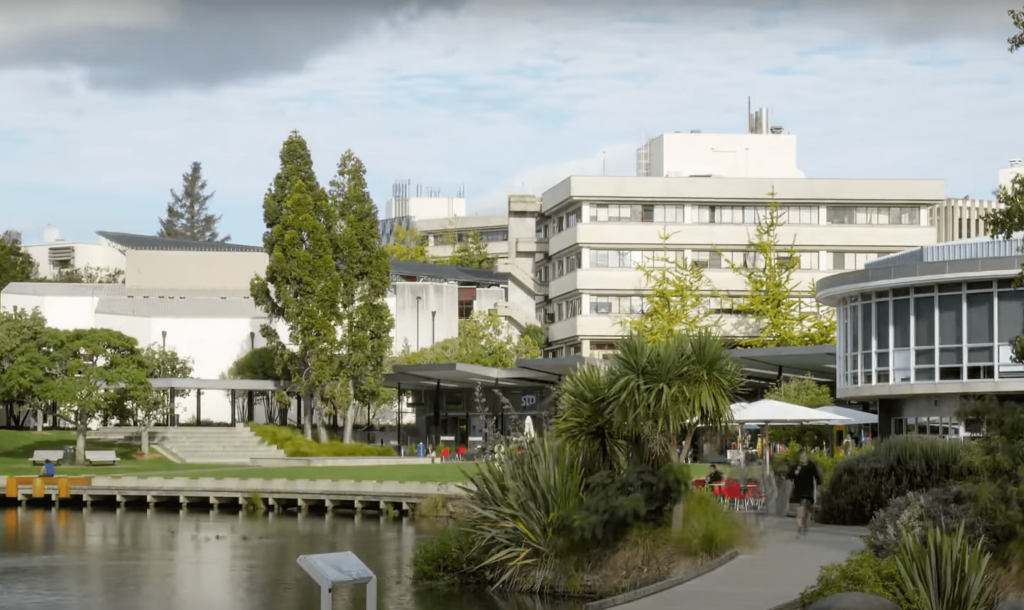Content:
Background
My academic and professional background is closely connected to information technology. I completed a Bachelor’s degree in Computer Science and worked for several years at an IT company in my home country. During that time, I was involved in software development and project management, which allowed me to gain a deeper understanding of the needs and trends in the IT field.
Choice of program
Choosing New Zealand and specifically the IT diploma program at the University of Waikato was a well-considered decision. I wanted to deepen my knowledge and skills in the field of information technology and gain international experience, which is of high value in my profession. I was looking for a program that would offer not only theoretical knowledge but also practical experience through projects and internships. The Master of IT program at the University of Waikato perfectly matched my requirements due to its strong focus on developing industry-relevant skills and providing opportunities for real project experience.
Admission process and student visa
The whole admission process took several months. It started with gathering the necessary documents and preparing for the IELTS exam, followed by submitting my university application. The most challenging part was waiting for the admission decision. But in the end, all the effort was worth it when I received my acceptance letter. After that, I began the student visa application process, which also took about two months. Overall, although the process was quite lengthy and required careful preparation and planning, it was clear and logical. Obtaining the student visa marked the final step before beginning a new chapter in my life and career in New Zealand.

Studying structure
The Master of IT program is structured to combine theoretical foundations with practical application. The schedule is designed to give students ample time for independent project work and in-depth study of the material. Typically, lectures and seminars are in the first half of the day, while the afternoons are for lab sessions, group projects, and self-directed learning.
Demands
Students are expected to actively participate in lectures and seminars, as well as complete all assignments on time. The requirements include regular homework, project work, assignments, and exams. To successfully complete the course, a student must not only earn a certain number of credits but also demonstrate a deep understanding of the subject, the ability to apply knowledge in practice, and the development of critical thinking skills.
Attendance
Although students can miss some classes without serious consequences, attendance is critically important for academic success. Professors often discuss material that is not included in the textbooks. So, participation in discussions can greatly support course comprehension. Nevertheless, the university offers flexibility in cases of valid reasons, such as illness or family circumstances.
Program’s strengths:
- Strong academic foundation and hands-on experience
- Highly qualified lecturers with real-world IT expertise
- Access to the latest technologies and labs
- Opportunities for networking with industry professionals and internships
Program’s weaknesses:
- A high degree of self-directed learning can be challenging for students used to more structured education
- The program’s intensity requires significant time investment and strong self-discipline
- Competition for spots in certain courses and internships can be high
Overall, the program offers a comprehensive approach to IT education, preparing students for successful careers in the fast-evolving tech industry. The key to success lies in active participation and a strong commitment to continuous self-improvement.
Teachers / Lecturers
The lecturers in the Master of IT program at the University of Waikato are highly qualified and possess substantial real-world experience in the field of information technology. Many of them are recognized experts in their respective areas, with significant research backgrounds and regular publications in leading academic journals. They actively support students in both their academic and professional development, offering valuable resources and guidance throughout the program.
Studying support
The lecturers are available for consultations and discussions outside of lectures and seminars, which ensures a personalized approach for each student. They also provide additional study materials and regularly update course resources to reflect current trends and technologies in the IT field.
Size of groups and internationality
The number of students per group may vary, but it usually does not exceed 20–30 people, which allows for more effective interaction with lecturers and fellow students. The program attracts students from all over the world, creating a diverse and multicultural environment. This provides a unique opportunity for knowledge exchange and cultural enrichment.

University campus
The campus of the University of Waikato impresses with its modernity and beauty. It is fully equipped to support both comfortable and productive learning. The green, spacious grounds of the campus encourage relaxation and inspiration. The university libraries offer extensive collections of books and journals, as well as access to electronic resources and specialized databases. Students have access to modern computer labs and specialized equipment, which are essential for the practical application of theoretical knowledge.
The campus also offers excellent sports facilities, including gyms, swimming pools, and sports fields, all of which are available to students. There are numerous student clubs and societies that allow students to engage in extracurricular interests and build social connections.
Overall, the Master of IT program and the university provide students not only with a high-quality education but also with a wide range of opportunities for personal growth and development.
Commuting to the University of Waikato by car is a very convenient and efficient option for me. It allows me to avoid depending on public transport schedules and eliminates the need to wait for buses or trains, especially during early mornings or late evenings.
Part-time work
Under the conditions of my student visa, I am allowed to work up to 20 hours per week during the academic semester, which limits my options to part-time positions. Due to this restriction and the specific nature of my specialization in IT, there aren’t many suitable vacancies available in my city. Nevertheless, I have been actively seeking opportunities and applying for positions that seem like a good fit.
There have already been cases where I reached the interview stage, which is encouraging in itself. These experiences not only provide me with valuable interview practice but also help me better understand what employers in New Zealand’s IT sector are looking for. I hope that one of these companies will offer me a position soon.
Work part-time: pros & cons
Pros: Part-time work offers the opportunity to earn money to cover expenses, gain valuable work experience and professional skills, and expand my network of professional contacts.
Cons: Balancing study and work can be challenging due to the increased workload and the need for careful time management. There is also the risk that working part-time could distract from studies and negatively affect academic performance.
Ultimately, I believe that with the right balance and approach, part-time work during my studies will bring more benefits than challenges and will help me achieve both my academic and professional goals.
Accommodation
Moving to New Zealand with my family a month before the start of the semester was a deliberate decision driven by the need to find permanent housing, which turned out to be quite a challenging task for several reasons:
- High demand in the rental market. Since many other students were also arriving and searching for housing at the same time, the demand for rental properties was extremely high, making it difficult to find available options.
- Transportation issues. Initially, I didn’t have a car, and getting around by taxi, electric scooters, or on foot was inconvenient—especially when I needed to visit multiple properties located in different parts of the city.
- High cost of temporary accommodation. While temporarily staying in an Airbnb, I faced high expenses, which added extra pressure to find permanent housing as quickly as possible.
- Landlord requirements. Many local landlords were quite strict about having a credit history or references from previous landlords. As a newcomer I obviously didn’t have it, which further complicated the rental process.
I made sure to start the process of opening a bank account while still in my home country, which ultimately took two months. This was necessary so that I could activate the account immediately upon arrival and be able to pay rent. Because financial transactions in New Zealand goes mostly through local banks.
From the moment we arrived to the moment we moved into our permanent home, only two weeks passed. This short timeframe was the result of intensive daily planning—sometimes scheduling 7 to 8 viewings per day—and visiting various properties all over the city.

Recommendations for future students
Moving to another country for your studies is a big step that requires careful planning and adaptation. Here are some tips that can help future international students navigate this journey and make their experience as productive and enjoyable as possible:
- Research the University and Program ThoroughlyMake sure the program aligns with your academic and professional goals. Visit the university’s website, read student reviews, and reach out to the international student support services for more information.
- Start Preparing EarlyThe process of applying, getting a visa, and finding accommodation can take a long time. Start as early as possible to avoid unnecessary stress and give yourself more time to adapt once you arrive.
- Be Aware of Cultural DifferencesLife, culture, and education systems can be very different from what you’re used to. Learn about the local culture and customs in advance to help with your transition and avoid culture shock.
- Stay Socially ActiveDon’t isolate yourself. Join student events, clubs, and organizations. Building social connections will help you adjust faster, make friends, and feel part of the community.
- Plan Your BudgetLiving abroad can be expensive, especially in the beginning when you’ll need to buy essentials and pay for housing. Create a spending plan and stick to it to avoid financial stress.
- Use All Available ResourcesUniversities often offer a wide range of support services for students—career counseling, academic help, job search assistance, and mentorship programs. Don’t hesitate to use these—they’re there to help you succeed.
- Be Open to New ExperiencesStudying abroad isn’t just about academic growth. It’s also about life experiences. Embrace every opportunity to learn outside the classroom by exploring the country and meeting new people.
- Stay Connected with HomeThanks to modern technology, it’s easy to stay in touch with family and friends. Regular calls and messages will help you feel supported and less homesick.
Remember, that every student has their own unique journey of adaptation. Be patient with yourself and don’t be afraid to ask for help when you need it. Studying abroad is a powerful opportunity for growth, learning, and building skills that will benefit you for the rest of your life.
About Kiwi Education
Working with Kiwi Education, and especially with manager Kristina, was a truly positive experience. Kristina proved to be a thoughtful and caring professional. She not only guided me through the university application process but also provided valuable support during my student visa application.
From the very beginning, Kristina took the initiative to understand my academic and professional goals in detail. She provided comprehensive information about different educational programs, taking into account my interests and preferences, which helped me make an informed decision.
Throughout the application and documentation process, she kept me regularly updated on the status of my application, responded promptly to my questions, and offered effective solutions to any issues that arose. Her professionalism and dedication made the entire process much smoother and far less stressful for me.
In addition, Kristina gave me plenty of useful advice about life in New Zealand, adapting to a new country, and finding accommodation. All that was especially valuable for me as an international student. Her support didn’t end after I received my visa and university admission. She continued to check in on my progress and well-being.
Overall, my experience with Kiwi Education and Kristina left me completely satisfied. I would highly recommend their services to anyone considering studying or immigrating to New Zealand.
